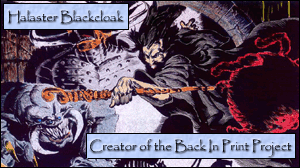Beowulf wrote:
I like magical level drains even less as to me they make absolutely no logical sense at all. You physically remain the same but lose just surgically specific skills related to game levels- really? That's the story the authors want to go with?
I've always seen level drains in a sense of "personal power" ala Carlos Casteneda. When you're drained of a level, you lose personal power, which is in a sense a measure of the power of your soul, your personal ability to do things. Being level drained lowers it, hence you lose abilities unless and until you can re-gain that power. Kinda hard to explain unless you read his books (Journey to Ixtlan is the best to understand it).
To me, level drains therefore always made sense, but they were just just very irritating to deal with because you have to erase spells, hit points, etc. So it's a lot of record keeping.
Artificial aging to me was always the most problematic threat. Let's say you see a ghost and fail your save, then age 10 years. You eventually overcome the fear, return to the party to help fight it, and it hits you - aging you 40 years. You're now 50 years older. Even if you started that adventure at the age of 16, you're now 66 years old and lose a 3 pts. of Strength, 2 pts. of Constitution, and 1 pt. of Dexterity. This will likely mean less fewer total hit points, worse thaco, lesser damage inflicted on enemies, less weight that can be carried, lesser chance to bend bars/lift gates, worse AC, worse ability to react to surprise, worse system shock, lesser chance of being raised, etc.
Besides the physical setbacks (lowered ability scores), there is the issue of people not being able to recognize you. Imagine being a 16 year old who is the heir to his father's farm. Your father dies, you try to collect your inheritance. Your father was 58, you're 66. How can you be his son? Would anyone even recognize you? Family? Friends? Acquaintances? I bet his 16 year old sweetheart is in for a shock when he comes home to her!

So yes, artificial aging is very involved and fraught with challenges for the players. And unlike losing a limb or being blinded (which can be healed using
regeneration) or losing a level (which can be reversed using
restoration), or even dying (which can be reversed using
raise dead or
resurrection), there is no (relatively) easy fix for artificial aging. I've had this argument numerous (numberless even!) times with the 3E crowd.
Youth potions do not work! An
elixir of longevity is the most powerful de-aging item in the DMG. It restores 1d12 years of aging for an average roll of 6-7 years. That 16 year old would need 7 such potions on average to restore the youthfulness lost to that ghost. And that's just for one character! An
elixir of youth restores just 1d4+1 years, for an average of 3-4 years restored. So it'll take 12-16 such potions to resolve the problem.
I for one do not hand out youth potions like candy on Halloween. Also, with the more powerful
potion of longevity, each time you drink one it has a
cumulative 1% chance of reversing all aging removed by that potion, past and current. So there's a danger of inevitable backfire.
You could certainly use a
wish spell, but those are given out very rarely in a well run campaign, so good luck getting one.
I also like artificial aging because it sets up quests to find a fountain of youth, research into spells or potions or other magic that can reverse the aging, quests taken for specific gods in return for restored youth, etc. It makes the DM get creative and the players to work hard.



